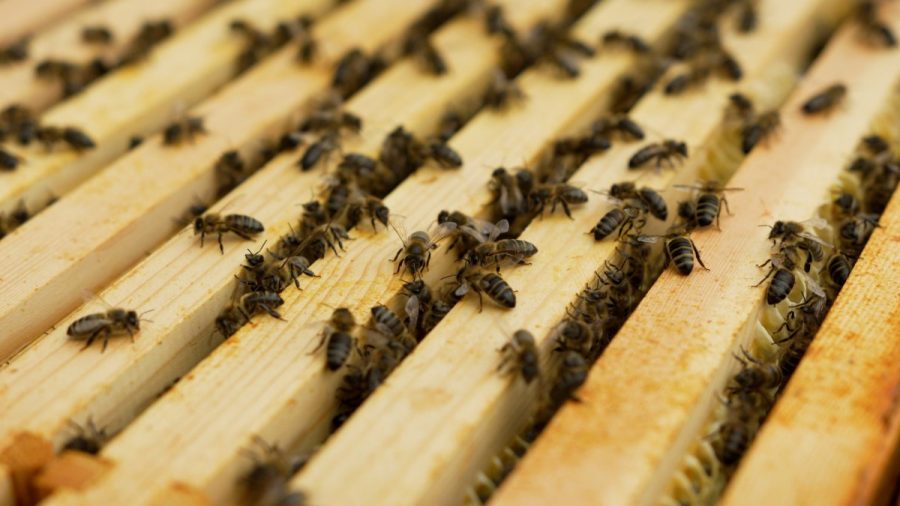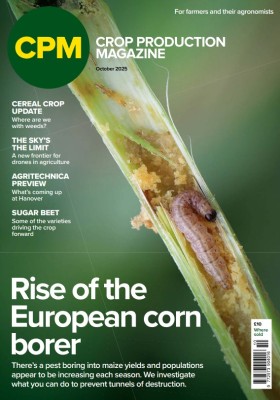Installing and managing beehives for corporate clients is not only helping to meet sustainability goals, but is also striving to improve the future of the native honey bee. CPM meets Buckley’s Bees, the Cheshire business behind the initiative.
“We provide responsible businesses with the opportunity to have their own fully-managed honey bee colonies on their premises.” EMMA BUCKLEY
By Janine Adamson
Following a successful awareness building campaign during recent years, society appears to be well on-board with the importance of pollinators – mainly bees – and the role they play in maintaining a healthy ecosystem.
However, the involvement of corporate businesses can also play a positive part in ensuring their survival, believes Emma Buckley.
In a bid to explore this opportunity further, Emma and her father David set about engaging with businesses and individuals through a unique business model – supporting companies to install and manage their own on-site honey bee colonies.
“We provide responsible businesses with the opportunity to have their own fully-managed honey bee colonies on their premises. Where this isn’t possible, we also offer the option to sponsor hives within our own apiaries.
“The hives are low-density and promote positive breeding for behaviour, good temperament and hygiene. Equally important is a focus on local breeding, particularly Apis mellifera mellifera (European dark bee) – a subspecies of the western honey bee – which is native to Britain,” she explains.
It’s important to note that Emma’s passion for honey bees isn’t something new – David is one of the longest surviving members of BIBBA (the Bee Improvement & Bee Breeders Association) and will celebrate his 60th year of beekeeping in 2026.
Consequently, she was exposed to the world of bees from a young age, highlights Emma. Together they offer more than 80 years of beekeeping experience, based from the family’s livestock farm in Cheshire.
While targeting the commercial world is a relatively new concept for the family, Buckley’s Bees already has an impressive client list including Taylor Wimpey, CGI and Bentley Motors. And aside from hitting corporate social responsibility targets (CSR), having an on-site hive is beneficial for employee engagement as well yielding the obvious – honey, says Emma.
“In some cases the bees are perceived as pets and as a result, unlock another level of engagement while re-emphasising where food comes from and why insects are so important.”
Recognising that not everyone is as knowledgeable about bees as the Buckleys, the support provided in getting things off the ground is plentiful.
“Aside from installing the hives we can also provide advice on how to increase nearby food sources as well as making informed considerations for the surrounding environment and wider biodiversity. An example being a new housing development where we recommended planting wildflowers rather than a standard green space because we knew it had more potential.
“We then employ local beekeepers to look after the hives on behalf of our corporate clients. Being UK-wide, it wouldn’t make much sense for dad and I to do this ourselves and it wouldn’t be tremendously sustainable,” adds Emma. “But crucially, we’re able to create paid employment opportunities for our fellow beekeepers.”
The freelance beekeeping team includes both hobbyists and professionals, hired on a range of contracts depending on their availability. “We do this to fill the gap in bee management and to help those who are less experienced to build their understanding. Dad also uses his wealth of experience to help with knowledge transfer.”
As cited on the company’s website, the ethos behind Buckley’s Bees isn’t profit-driven, it’s based on a genuine desire to do more. In fact, commercial honey production couldn’t be further from the end goal.
“We want to play our part in reversing native honey bee decline. In 1900 there were an estimated 1M honey bee colonies in the UK, yet now there are just 270,000. Another problem we’re facing is a shift in species – we desperately want to see native bees back in the UK.
“Not only are they hardier and more frugal when it comes to finding food sources, but they’re also more docile. In fact, we rarely use gloves when we’re inspecting our home-bred hives,” states Emma.
To that end, not dissimilar to livestock, the business implements a closed-breeding system to produce its own queens and colonies. This is to help ensure the stock they install isn’t diluted by imported strains which can lead to aggression and disease issues.
Looking to the future, Emma, a Harper Adams graduate, says she wants to expand her client base including working with more arable farmers. “As well as our typical corporate customers, we’re happy to work with individual farming businesses too, whether that’s installing hives or providing management advice.
“Knowledge regarding the importance of habitat diversity is certainly improving, no doubt accelerated by the introduction of SFI. It’s just making those links between rural and urban communities, helping to establish connected habitat corridors for much broader pollinator coverage,” she suggests.
Plans also include continuing to work with local schools which the Buckleys are already adept at, and eventually, developing an education centre at Buckley’s Bees HQ. “I’d love to use the bees and the livestock farm for education and to support mental well-being,” adds Emma.
For those looking to better understand their on-farm pollinator requirements in the first place, there’s now technology available to help. Delivered by AI-driven company, AgriSound, the ‘Polly’ system involves a smart listening device which uses advanced bioacoustic algorithms to automate insect monitoring.
Founder Casey Woodward says capturing this sort of data can be used in two ways – to inform precision pollination requirements, or, to help measure biodiversity for stewardship reporting.
“The OSR Reboot project led by AHDB and United Oilseeds has found that sub-optimal pollination is a low-hanging fruit when it comes to improving the success rate of crops like oilseed rape; pollination is key for both yield and quality gains.
“By using Polly to listen within a crop and therefore measure insect abundance, growers can target specific areas with proactive measures, such as by adding a hive. In some instances, this could mean working with companies like Buckley’s Bees,” he explains.
Looking at Polly in more detail, the technology is based on a solar-powered unit that’s optimised to detect pollinators like bumble bees and honey bees. Data is then transmitted via a cellular connection and accessed through a secure data storage platform.
Once growers have purchased the unit, there’s a monthly subscription fee that covers ‘wrap around care’ from pollinator experts via Whatsapp, who assist with critical data interpretation, adds Casey.
“This is to ensure growers maximise the value from their pollinator services. Furthermore, during our development phase, it became apparent that the preferred communication method is WhatsApp because it’s simple and direct, and avoids users having to log into a specific platform if they don’t want to.”
With Polly formally launched in 2023, AgriSound has already developed relationships with retailers such as Marks & Spencer, as well as working with a range of individual growers.
Casey says the data shines a light on pollinator performance. “Behavioural patterns, especially foraging, reveal not only the quantity of pollinators, but also colony health status including bee pest and disease pressure.
“Equally, growers may have pollinators, but Polly reveals they’re in fact foraging in wildflowers or a nearby crop and not the target area.” he concludes.
This article was taken from the latest issue of CPM. Read the article in full here.
For more articles like this, subscribe here.
Sign up for Crop Production Magazine’s FREE e-newsletter here.





